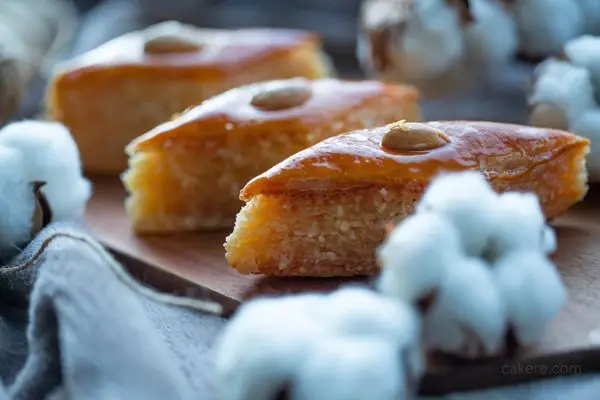Basbousa cake, also known as revani or harisa, is a delicious sweet treat with a rich history deeply rooted in the Middle East.

Origin and Background
Basbousa Cake’s Roots
The roots of Basbousa cake can be traced back to the Middle East, particularly Egypt and Lebanon. It originated in Egypt during the era of the Ottoman Empire and was traditionally made during festive occasions and religious celebrations.
Over time, it spread to neighboring countries, each adding their own unique twist to the recipe.
Traditional Middle Eastern Dessert
Basbousa cake is an integral part of Middle Eastern cuisine. It is often served as a sweet treat during Ramadan and other special occasions.
The cake’s popularity can be attributed to its simple yet delightful combination of semolina, sugar, and soaked in aromatic syrup.
Ingredients and Preparation
Semolina and Other Key Ingredients
A key component of Basbousa cake is semolina, a coarse flour made from durum wheat. It gives the cake its distinct texture and adds a pleasant graininess.
Other essential ingredients include sugar, butter or ghee, yogurt, and baking powder. Nuts such as almonds or pistachios are often used for garnishing.
Soaking Syrup
What sets Basbousa cake apart is the soaking syrup that is poured over the baked cake. This syrup, typically made with a combination of water, sugar, and lemon juice, infuses the cake with a sweet and tangy flavor. It also ensures that the cake remains moist and tender.
Regional Variations
Egyptian Basbousa
Egyptian Basbousa is characterized by its use of coconut and sometimes flavored with rose or orange blossom water. The cake is often shaped into diamonds or squares and topped with almonds or coconut flakes.
Lebanese Namoura
In Lebanon, Basbousa cake is known as Namoura. It is often made with a combination of semolina and coarse semolina, giving it a unique texture. Namoura is usually cut into diamond or square shapes and garnished with pine nuts.
Cultural Significance
Basbousa cake holds significant cultural value in the Middle East. It is a symbol of hospitality and is commonly offered to guests as a gesture of warmth and generosity. The cake’s presence at celebrations and gatherings brings people together, fostering a sense of community and tradition.
Popular Adaptations and Modern Twists
As Basbousa cake gained popularity beyond the Middle East, it started to undergo various adaptations and modern twists.
Chefs and home bakers worldwide began experimenting with different flavors and ingredients to put their own spin on this beloved dessert.
Some popular adaptations include adding fruits such as strawberries or mangoes, incorporating chocolate or caramel drizzles, and infusing the cake with aromatic spices like cardamom or cinnamon.
Basbousa Cake Around the World
Thanks to globalization and the spread of Middle Eastern cuisine, Basbousa cake can now be found in many parts of the world.
From upscale patisseries to local bakeries, this delectable dessert has made its way onto menus, captivating dessert lovers everywhere.
It has become a symbol of cross-cultural appreciation, showcasing the beauty and richness of Middle Eastern culinary traditions.
Health Benefits
Basbousa cake, while undeniably delicious, also offers some health benefits. Semolina, the main ingredient, is a good source of carbohydrates and provides energy.
It is also rich in fiber, which aids in digestion and promotes a healthy digestive system. However, it’s important to consume Basbousa cake in moderation due to its sugar content.
FAQs
While semolina is the traditional choice for Basbousa cake, you can experiment with other flours like almond flour or all-purpose flour. However, keep in mind that the texture and flavor may differ from the authentic version.
When stored in an airtight container, Basbousa cake can stay fresh for up to 3-4 days at room temperature. You can also refrigerate it to extend its shelf life.
No, Basbousa cake is not gluten-free as it is primarily made with semolina, which contains gluten. If you require a gluten-free option, you can explore recipes that use alternative flours.
Yes, Basbousa cake can be frozen. Wrap individual slices or the whole cake tightly in plastic wrap or place them in airtight containers before freezing. Thaw the cake in the refrigerator before serving.
The soaking syrup for Basbousa cake can be customized with various flavors such as rosewater, orange blossom water, or even a hint of lemon zest. You can adjust the sweetness and tanginess to suit your preference.
Conclusion
In conclusion, Basbousa cake has a fascinating history that dates back centuries and originated in the Middle East.
It has evolved and adapted over time, becoming a beloved dessert worldwide. Its unique combination of semolina, soaked in a fragrant syrup, creates a delightful sensory experience for dessert enthusiasts.
